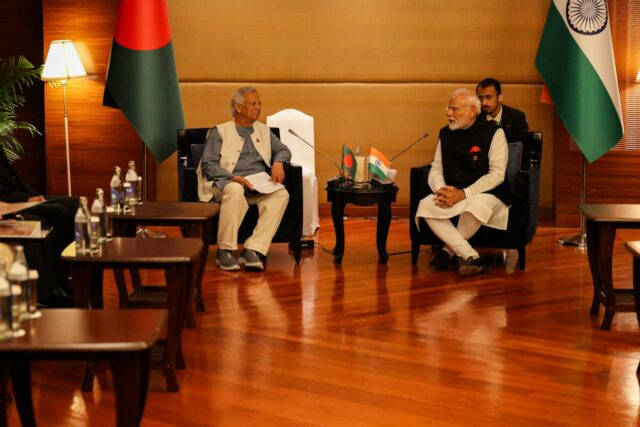
India has withdrawn a key trade facility that allowed Bangladeshi export cargo to move through its territory to third countries, days after Bangladesh’s interim leader, Professor Muhammad Yunus, suggested Northeast India could serve as an economic extension of China.
The Central Board of Indirect Taxes and Customs (CBIC) issued a circular on April 8 rescinding a 2020 policy that had permitted the transshipment of export cargo from Bangladesh via Indian Land Customs Stations (LCSs) to Indian ports and airports. The arrangement had previously enabled Bangladeshi goods to reach nations like Nepal, Bhutan, and Myanmar more efficiently, cutting down both transit time and logistics costs.
The move comes on the heels of Yunus’s visit to China from March 26 to 29, during which he referred to India’s Northeast as a “landlocked” region with “no direct access to the ocean,” positioning Bangladesh as the “only guardian of the ocean” for the area. He proposed deeper economic integration with China and suggested that Bangladesh could become a vital maritime and manufacturing gateway for the entire region.
These remarks were widely viewed in India as provocative and strategically insensitive, particularly given the proximity of China to India’s vulnerable Siliguri Corridor — the narrow 22-km strip linking mainland India to the Northeast.
Reacting strongly, Assam Chief Minister Himanta Biswa Sarma called Yunus’s comments “offensive” and reiterated the need to improve alternative routes that bypass the Chicken’s Neck area to ensure the Northeast’s security and connectivity.
In its statement, India’s Ministry of External Affairs cited logistical congestion at ports and airports caused by the transshipment facility as one of the reasons for its withdrawal. The ministry noted that delays were affecting India’s own export performance and causing backlogs in major trade hubs.
Behind the scenes, however, the move appears closely tied to strategic concerns. Observers suggest that Bangladesh’s push to attract Chinese investment near India’s sensitive Northeast — including proposals to develop the Lalmonirhat airbase near the Siliguri Corridor — may have triggered a reassessment of India’s support for Dhaka’s trade privileges.
For years, India has offered generous trade access to Bangladesh, including zero-tariff entry for nearly all goods (excluding alcohol and tobacco). The now-revoked facility had further bolstered Bangladesh’s connectivity to the broader South Asian market. Its sudden removal is expected to disrupt Dhaka’s trade with Bhutan, Nepal, and Myanmar, which heavily rely on Indian infrastructure to reach global markets.
The decision may also cause concern in Nepal and Bhutan — both landlocked — as the move could limit their ability to engage in cost-effective trade with Bangladesh. While India clarified that the change would not affect goods already in transit under the previous system, exporters may now face increased uncertainty, longer delays, and higher transport costs.
Trade analysts have also pointed out potential implications under World Trade Organization (WTO) rules. Article V of the General Agreement on Tariffs and Trade (GATT) 1994 mandates freedom of transit for goods to and from landlocked countries. The WTO’s Trade Facilitation Agreement (TFA) further emphasizes the need for transparent, efficient, and cooperative transit procedures. Critics argue that the rollback could invite scrutiny regarding India’s compliance with these commitments.
At the same time, the decision is likely to benefit certain Indian export sectors. Industries like textiles, footwear, and gems and jewellery — where Bangladesh has been a strong competitor — may gain a competitive edge in regional markets if Bangladeshi exports are slowed down by logistical barriers.
The decision comes less than a week after Prime Minister Narendra Modi met the chief adviser to Bangladesh’s interim government, Md Yunus, on the sidelines of the BIMSTEC meeting in Bangkok, Thailand.
In the first in-person meeting between the two leaders since the fall of the Awami League government led by Prime Minister Sheikh Hasina and the formation of the interim government under Yunus’s leadership, Modi had raised the issue of the safety and security of minorities in Bangladesh, including Hindus, and warned against any rhetoric which vitiates the environment.
In a career spanning three decades and counting, Ramananda (Ram to his friends) has been the foreign editor of The Telegraph, Outlook Magazine and the New Indian Express. He helped set up rediff.com’s editorial operations in San Jose and New York, helmed sify.com, and was the founder editor of India.com.
His work has featured in national and international publications like the Al Jazeera Centre for Studies, Global Times and Ashahi Shimbun. But his one constant over all these years, he says, has been the attempt to understand rising India’s place in the world.
He can rustle up a mean salad, his oil-less pepper chicken is to die for, and all it takes is some beer and rhythm and blues to rock his soul.
Talk to him about foreign and strategic affairs, media, South Asia, China, and of course India.




